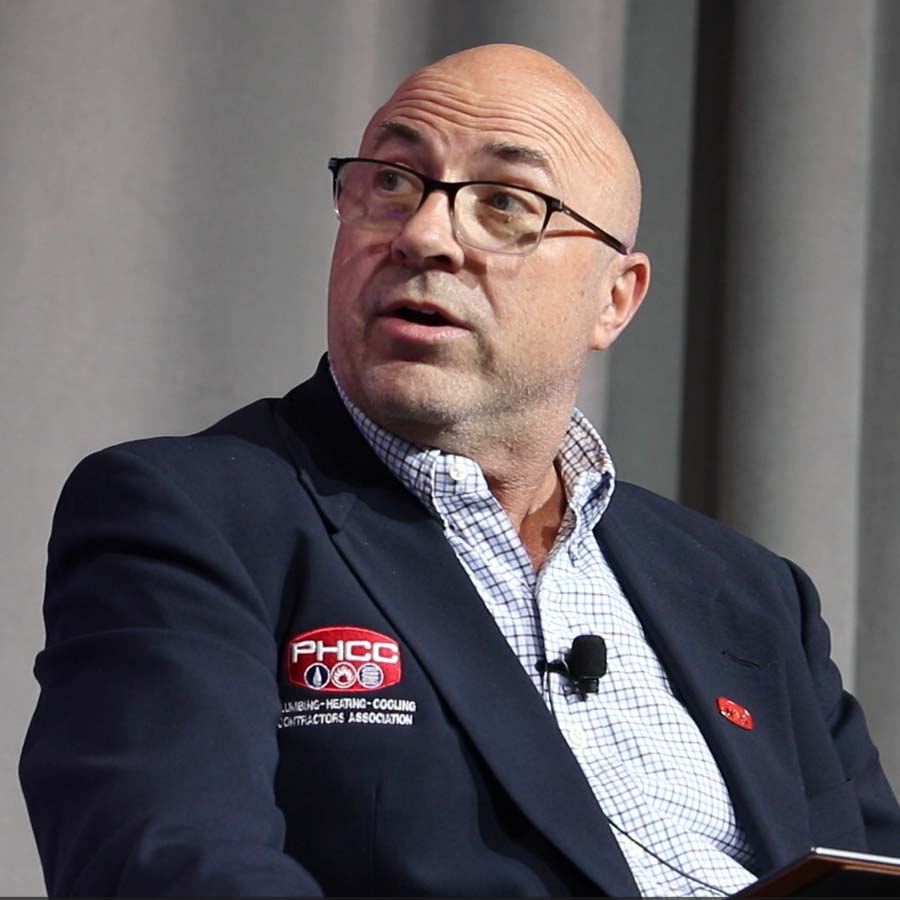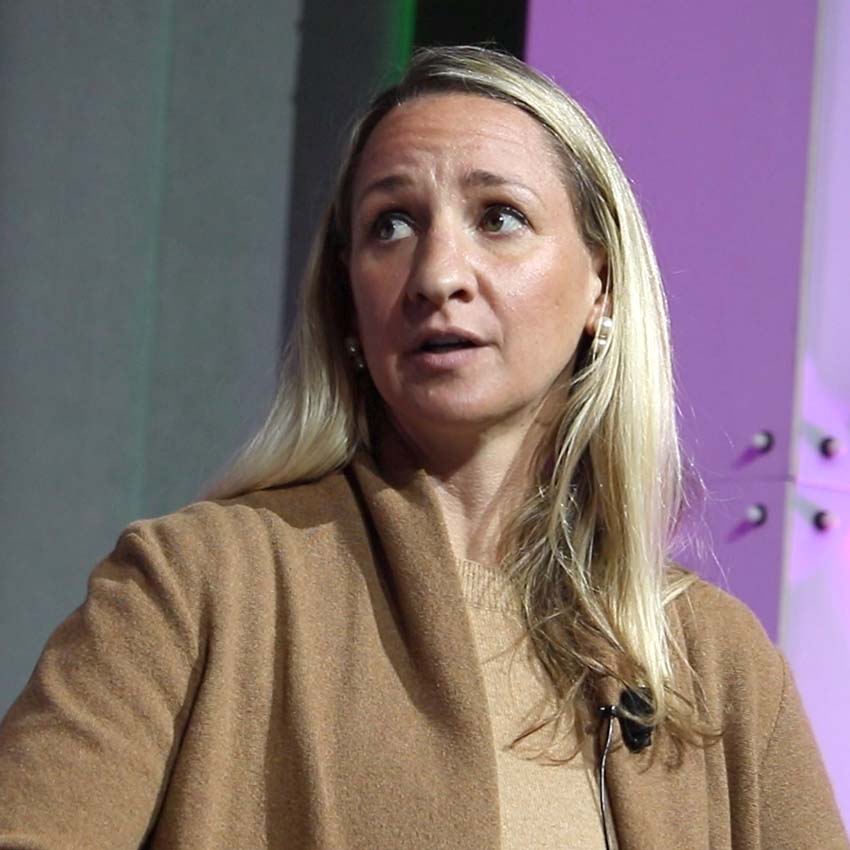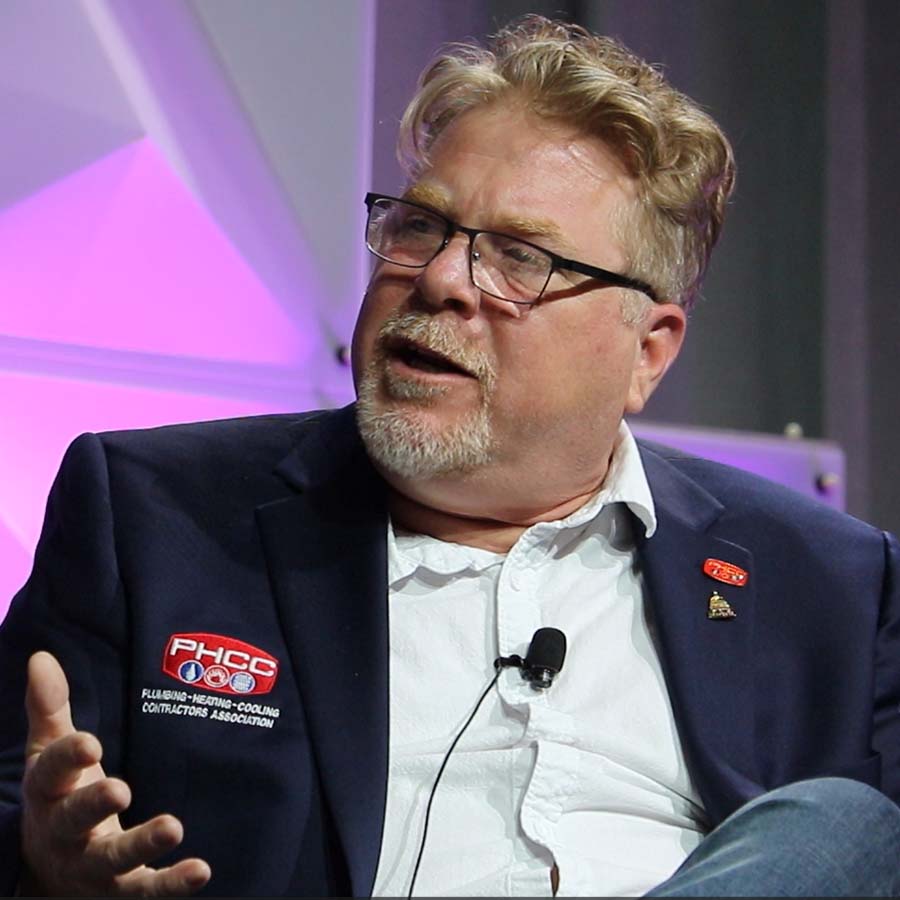The symbiotic relationship between HVAC distributors and installers has existed for decades and will likely continue, in some form or fashion, for many years to come.
The nuances of this supply chain partnership was examined in-depth at the Plumbing-Heating-Cooling Contractors’ National Association’s (PHCC’s) PHCCCONNECT2023 event, Oct. 25-27 in Cleveland. A roundtable discussion, moderated by Robert Grim, senior vice president, sales, InSinkErator, brought industry leaders, suppliers, and contractors together to explore the power of collaboration and discuss effective strategies for strengthening existing and future relationships. Topics ranged from emerging trends, cutting-edge technologies, pricing, and much more. Following are some of the highlights.

Dan Callies
President, Oak Creek Plumbing Inc. (Staff photo)

Kathyrn Poehling-Seymour
CEO and president, First Supply. (Staff photo)

Jason Pritchard
General manager, PriCor Technologies. (Staff photo)

Scott Robertson
President, Robertson Heating Supply Co. (Staff photo)
Grim: Do you believe collaboration between suppliers and contractors is a critical aspect of the industry? How can wholesalers and contractors best align their respective goals to ensure a mutually beneficial relationship?
Kathyrn Poehling-Seymour, CEO and president, First Supply: I come from a multigenerational family businesses, and I’ve found that many distributor, and contractors have this in common. Our businesses are our families, and our families are our businesses. One of the biggest opportunities for us to continue to collaborate is understanding each other's pain points. One of my favorite parts of the job is getting to walk around a shop and understand what's working, what's not working, and how we can come together to actually solve any problems. It’s important for distributors to continue to add value to our contractor partners’ businesses and make all of our lives easier.
Dan Callies, president, Oak Creek Plumbing Inc.: How we work together affects our businesses, efficiencies, and profitability. We must continue to work together because a rising tide raises all boats. We all want what we want, when we want it, and we expect to pay less for it than we want to sell it for. That said, we must truly focus and develop our relationships on our end users. Every party that touches a product before it gets installed plays a role. We must create environments and cultures that provide a win-win environment for everyone.
Grim: What are some key expectations that contractors have of wholesalers? And vice-versa. How do these expectations impact the collaborative dynamic between wholesalers and contractors?
Jason Pritchard, general manager, PriCor Technologies: We're in the relationship industry. So, first of all, good old-fashioned communication is absolutely imperative. Our partners know things that we don't know. Of course, we need to know these things so we can teach them to our employees.
While it'd be great if we got the best pricing all the time, I’m happy to pay a little bit more for a great relationship with someone who truly understands our needs.
Scott Robertson, president, Robertson Heating Supply Co.: If we go back to the boardroom level, both wholesalers and the contractors have mutual goals. Both parties need to make money. We've both got to be profitable, right? At the highest level, we have to keep that in mind. As a third-generation wholesaler, who remains committed to the industry, we’re interested in as much loyalty as we can get in the channel with our contractors. We know it comes down to pricing, from time to time, but what we would hope for is that contractors continue to invest in the wholesalers that have made investments in their areas.
We've got 39 locations across five states. It costs $750,000 to open a location, which is a major investment. We hope that that gives us an edge over a wholesaler that's willing to ship a product in from 35 miles away, simply because they beat our price by a couple of bucks.
Grim: Wholesalers strive to provide what we call “value-added services.” Can you provide a couple of examples of these value-added services?
Poehling-Seymour: A lot of companies can move boxes, but it's important that we've got the right products at the right time for the right price. And that's just the basics.
So, what’s it mean to be a value-added partner? There are all sorts of things that contribute to this. We just opened a state-of-the-art training facility, which was immensely important not only for our current customers but for area trade schools as well. Students have already been training in that facility, getting a taste of the industry and gaining hands-on experience.
Additionally, we can now teach lessons virtually. Somebody up in Brainerd, Minnesota, can stream into our facility while training classes are happening and learn for themselves. Maybe a manufacturer on the East Coast is streaming as well, and we’ve created this connected network of people who are learning, growing, developing, and hopefully buying more of the products they’re learning about.
Above all of this, it’s all about our people. It's the people who show up at our facilities, every day. The outside salespeople, inside salespeople, credit team, delivery drivers, kitchen and bath store design teams, etc., those are the people who are really adding value to what is happening out in the field every day because they’re taking care of the end users.
Callies: It's great to go down memory lane a little bit. The first value proposition during my time in the industry was the fax machine. When that was introduced, it was like, “Holy cow, you can place an order through a machine.” Then, online ordering came about, further increasing efficiencies and accuracies. Since then, the definition of value-added has since been refocused on business practices, technical trainings, and the ability to educate installers.
Has anyone heard of Pappy Van Winkle? It’s a wonderful bourbon, and they have saying that says, “We’ll make fine bourbon at a profit if we can, at a loss if we must, but we’ll never sacrifice quality.” We must strive to follow this as well.
There is an expense to provide these value propositions, they’re not free. Whether it's time or cost, everyone has to contribute. It's just part of the cost of doing business. However, if you choose not to offer such advantages, and your customer experience is lacking, then expect your advertising budget to go through the roof. Marketing is the tax you pay for not being remarkable, and without value-added services, you’ll be doing a lot of marketing.
Robertson: You have to stay active and current, and that’s a challenge. We’re constantly communicating with our most progressive contractors to ensure we're not just guessing in the boardroom.
One thing we're currently working on now is an inventory management system for contractors. Some of our larger contractors are beginning to hold inventory more and more. They have service trucks with inventory, warehouses with inventory, etc. They need a way to keep track of all of this stuff? How do you know what you have? How do you know what you need? How do you scan it in and scan it out? The inventory management business is our business. We do that better than anyone else.
All we ask for, at the end of the day, is if we, the distributors, come up with a value-added service that you, the contractors, are willing to benefit from, that you use it and pay for it. There's nothing more frustrating than to spend time, talent, and money on a service or technology solution and not have it utilized.



Report Abusive Comment